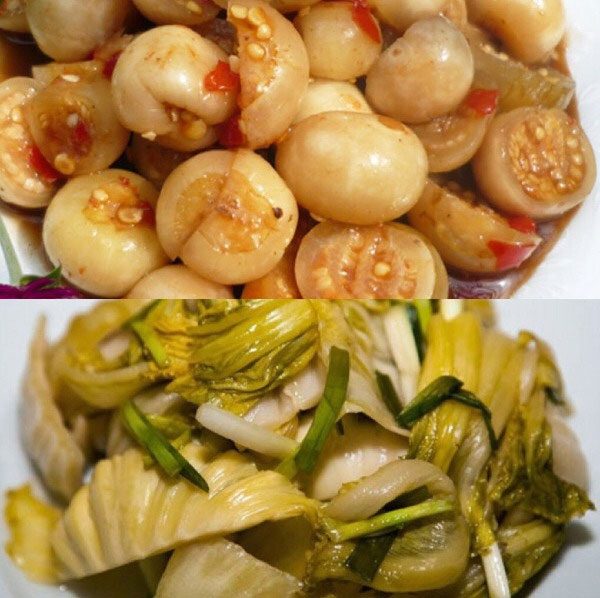Pickled onions, pickled vegetables, and fermented eggplant can pose significant health risks, especially for certain individuals who should avoid these foods.
Dr. Hoang Thi Linh Lan states that the nutritional value in pickled vegetables and eggplant is limited, containing only small amounts of vitamins, protein, and carbohydrates.
Many people believe that pickled vegetables and eggplant contain beneficial probiotics for health. In reality, these pickled foods often harbor various bacteria, including harmful lactic acid bacteria that can cause illness and parasites. Even if the food is prepared hygienically, it is advisable not to consume them excessively or continuously.
Pickled onions and vegetables also carry health risks, particularly for certain groups of people who should avoid them.

Pickled vegetables and eggplant are common in Vietnamese meals, but not everyone is suitable to consume them. (Photo: Cam Anh).
Individuals who should avoid pickled vegetables and eggplant:
Digestive Disorders
Those with poor digestive systems are more susceptible to infectious diseases like diarrhea, dysentery, cholera, and typhoid when consuming pickled foods. Individuals suffering from stomach pain should also limit their intake when experiencing discomfort in the upper abdomen. The reason is that the high acidity in these foods can irritate the stomach lining, leading to chronic inflammation or ulcers.
High Blood Pressure
Excess salt increases cell membrane permeability to sodium, leading to vasoconstriction, which can raise blood pressure and heighten the risk of complications in patients.
Kidney Failure
In cases of kidney failure, the kidneys’ ability to filter toxins is diminished. Eating salty foods can elevate blood pressure and cause water retention, leading to swelling and weight gain, which can affect medication efficacy. Therefore, patients with kidney issues should limit their salt intake and consumption of pickled vegetables and eggplant.
Pregnant Women
Pickled vegetables and eggplant contain nitrites that can combine with amines in meat and fish to form nitrosamines, which are carcinogenic. Pregnant women who consume these excessively may risk negatively impacting uterine function, which is not beneficial for the fetus. While complete avoidance is not necessary, moderation is key, especially with quick pickles and those made from unripe vegetables.
Individuals Recovering from Illness or Experiencing Weakness
According to traditional medicine, eggplant has cooling properties, thus should be avoided by those with a cold constitution. Care should be taken when combining it with other cooling foods, and it should be consumed with warming spices (like garlic, chili, and lemongrass). Particularly, individuals who are physically weakened or recently recovered from illness should refrain from eating pickled vegetables and eggplant.
To safely enjoy pickled vegetables and eggplant, Dr. Lan recommends:
- Do not consume large quantities, especially on an empty stomach. Each person should limit their intake to about 50g per week.
- Avoid pickled vegetables that are still pungent, spicy, or have an off taste, as well as those that are overripe, too sour, discolored, slimy, or have visible mold.
- Before consuming, rinse the pickled vegetables several times to reduce saltiness and acidity.
- When pickling, wash all ingredients and utensils thoroughly. Do not use recycled plastic or paint buckets, as they may leach harmful chemicals. Glass or enamel-coated ceramic jars are recommended.
- Homemade pickles are preferable to store-bought ones as they allow you to control salt levels and ensure the food is clean and free from additives and preservatives.
- Do not return leftover pickled vegetables back into the jar to prevent spoilage; use clean utensils to serve them; seal the jar tightly and store it in the refrigerator.
- Avoid consuming unripe eggplant as it contains solanine, which can lead to poisoning.
Is eating too much pickled eggplant and vegetables linked to cancer?



















































